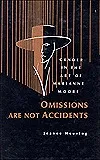Omissions Are Not Accidents: Gender in the Art of Marianne Moore
By (author): "Jeanne Heuving"

ISBN0814323359
ISBN139780814323359
AsinOmissions Are Not Accidents: Gender in the Art of Marianne Moore
Original titleOmissions Are Not Accidents: Gender in the Art of Marianne Moore
Feminist literary criticism has been able to discuss the significance of a woman writer's gender to her literary production most propitiously by analyzing its representation of gender and of gender issues. But for women writers, such as Marianne Moore, who refuse to make gender a central subject of their writing, this approach offers limited insight. And yet, gender is a crucial determination of Moore's poetic production, and much of her poetry, especially her earlier poetry, was a creative, and feminist, response to that determination. Omissions Are Not Accidents argues that the aesthetic achievement of Moore's poetry can better be appreciated and judged by considering how gender structures her work. The difficulty of Moore's poetry is elucidated precisely by realizing the paradoxical nature of her poetic quest: to give expression to a transcendent art and also to herself as a woman. Refusing to write as a member of the "second sex," even to disclaim her second-rate status, Moore instead produced a poetry that is subversive of existing meanings - a richly ambiguous and multivalent art. By attending to Moore's position as a woman within her culture and within language, Heuving has established a comprehensive explanation of the chronological development of her innovative writing. Through an exploratory discussion of feminist critical theory, Heuving establishes Moore's poetry as a profound response to a poetic tradition that relies on a singular figure of Woman for its coherence, closure, and vicissitudes. Writing an initial poetry of "understatement," Moore staged the dilemma of her subjectivity. Indeed, Moore's much noted "reserve" is shown to be a strategic response to her gender that enabled Moore to produce a poetry of her own will and desire. Only later, in a poetry of "overstatement," did Moore give up her paradoxical quest, capitulating to dominant forms of meaning. From her earliest poetry written while she was a student at Bryn Mawr, Moore worked to cr